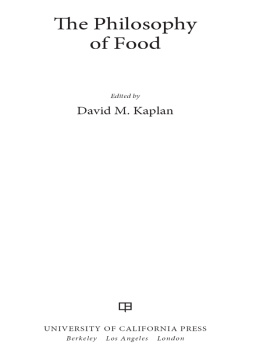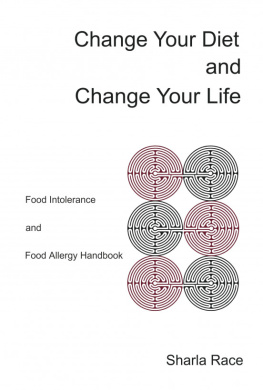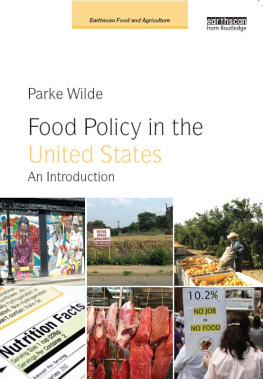University of California Press, one of the most distinguished university presses in the United States, enriches lives around the world by advancing scholarship in the humanities, social sciences, and natural sciences. Its activities are supported by the UC Press Foundation and by philanthropic contributions from individuals and institutions. For more information, visit www.ucpress.edu.
University of California Press, Ltd.
London, England
The philosophy of food / edited by David M. Kaplan.
p. cm.
Includes bibliographical references and index.
ISBN 978-0-520-26933-0 (cloth : alk. paper)
ISBN 978-0-520-26934-7 (pbk. : alk. paper)
1. Food. I. Kaplan, David M.
TX357.P53 2011
641.3dc23
2011032946
In keeping with a commitment to support environmentally responsible and sustainable printing practices, UC Press has printed this book on Rolland Enviro100, a 100% post-consumer fiber paper that is FSC certified, deinked, processed chlorine-free, and manufactured with renewable biogas energy. It is acid-free and EcoLogo certified.
Introduction
The Philosophy of Food
David M. Kaplan
Philosophers have a long but scattered history of analyzing food. Plato famously details an appropriate diet in Book II of the Republic. The Roman Stoics, Epicurus and Seneca, as well as Enlightenment philosophers such as Locke, Rousseau, Voltaire, Marx, and Nietzsche, all discuss various aspects of food production and consumption. In the twentieth century, philosophers considered such issues as vegetarianism, agricultural ethics, food rights, biotechnology, and gustatory aesthetics. In the twenty-first century, philosophers continue to address these issues and new ones concerning the globalization of food, the role of technology, and the rights and responsibilities of consumers and producers. Typically, these philosophers call their work food ethics or agricultural ethics. But I think they sell themselves short. Philosophers do more than treat food as a branch of ethical theory. They also examine how it relates to the fundamental areas of philosophical inquiry: metaphysics, epistemology, aesthetics, political theory, and, of course, ethics. The phrase philosophy of food is more accurate. We might eventually come to think of the philosophy of food as a perfectly ordinary philosophy of if more philosophers address food issues and more colleges offer courses on the subjector at least that is my hope.
But why is this subjecta footnote to Plato just like the rest of the philosophynot yet fully entrenched as a standard philosophical subject? Why do philosophers only occasionally address questions concerning food? The subject is obviously important and the scholarship on food has real pedigree. So why does philosophy of food have a novel ring? Some have argued that food is eschewed because of the perception that it is too physical and transient to deserve serious consideration. These are all plausible explanations.
But perhaps the real reason why relatively few philosophers analyze food is because it is too difficult. Food is vexing. It is not even clear what it is. It belongs simultaneously to the worlds of economics, ecology, and culture. It involves vegetables, chemists, and wholesalers; livestock, refrigerators, and cooks; fertilizer, fish, and grocers. The subject quickly becomes tied up in countless empirical and practical matters that frustrate attempts to think about its essential properties. It is very difficult to disentangle food from its web of production, distribution, and consumption. Or when it is considered in its various use and meaning contexts, it is too often stripped of its unique food qualities and instead seen as, for example, any contextualized object, social good, or part of nature. It is much easier to treat food as a mere case study of applied ethics than to analyze it as something that poses unique philosophical challenges.
But things are starting to change. The level of public discourse about diet, health, and agriculture in the United States is remarkably more sophisticated than it was only ten years ago. Food books are best sellers, cooking shows are ubiquitous, and the public is more informed about food safety and food politics. The mainstream media no longer tend to blame malnutrition and food insecurity on overpopulation but on poverty and poor governance. And most people, I suspect, regardless of one's take on animal ethics, would be sickened to learn that a staggering fifty-six billion land animals are slaughtered each year for food. Hopefully, we are not just following a trend but helping to steer it in a more intelligent and responsible direction.
The role of philosophy is to cut through the morass of contingent facts and conceptual muddle to tackle the most basic questions about food: What is it exactly? What should we eat? How do we know it is safe? How should food be distributed? What is good food? These are simple yet difficult questions because they involve philosophical questions about metaphysics, epistemology, ethics, politics, and aesthetics. Other disciplinary approaches may touch on these questions concerning food but only philosophy addresses them explicitly. Once we have a clear understanding of philosophy's unique role, we will all be in a better position to engage in dialogue aimed at improving our knowledge, practices, and laws. We should also gain a renewed appreciation for the scope and relevance of the discipline of philosophy itself.
FOOD METAPHYSICS
We presuppose some conceptionhowever vagueof what food is whenever we eat or identify something as food. Different conceptions can have real consequences for our health, the environment, and the economy. Metaphysics makes these implicit assumptions explicit by examining the very notion of what food is and what property or properties make something food. The answers to questions concerning the nature of food are not at all obvious. Nor are the answers to other metaphysical questions about the difference between natural and artificial food, the identity of food over time (from raw to cooked to spoiled), the difference between food and an animal, or the difference between food and other edible things (such as water, minerals, or drugs). Predictably, there is no consensus among philosophers about the nature of food, but there are several good candidates.
Food as nutrition. Food is a substance or material that originates in the environment in plants, animals, or water. It is made up of naturally occurring nutrients metabolized by an organism to sustain, grow, and repair vital life processes. The primary function of food is to provide nourishment to an organism. Nourishment is furnished by nutrients: carbohydrates, fats, fibers, protein, vitamins, and minerals. These and other chemical compounds are essential for basic bodily functioning. Food on this model has objective properties (that are really present) that are not open to interpretation.
Food as nature. Nature is not only objective but also normative. It is oft en perceived to have intrinsic value distinct from its instrumental value satisfying human ends. In this sense, food not only comes from nature but it is good when it does and bad when it does not. The more natural food is, the better it is. When viewed holistically as a part of a food chain, food production and consumption are seen as belonging to interdependent ecological relationships. The more we live in accordance with natural processes, the more healthy and balanced our lives will be. Harmony with nature is good; disharmony, bad.







